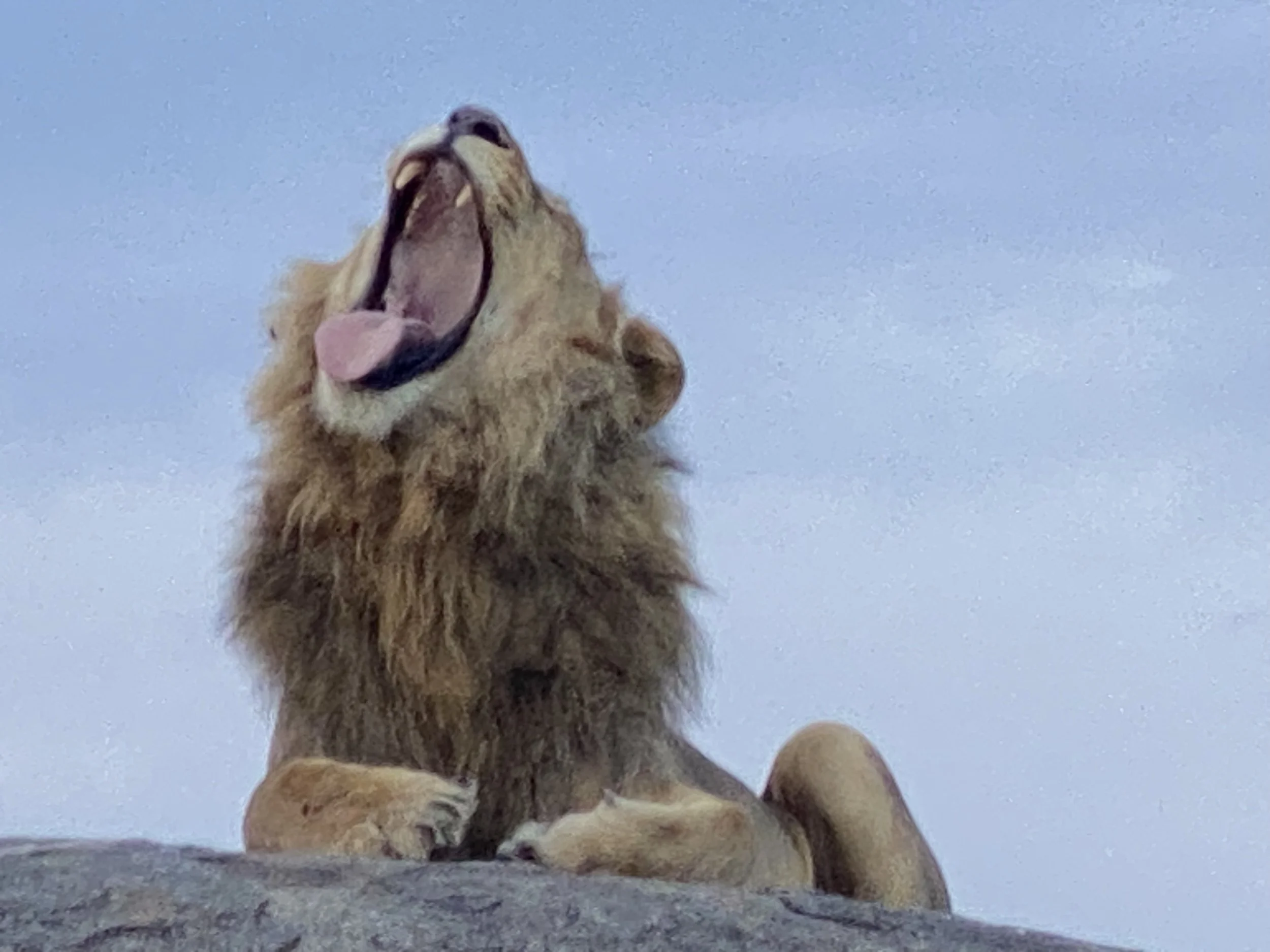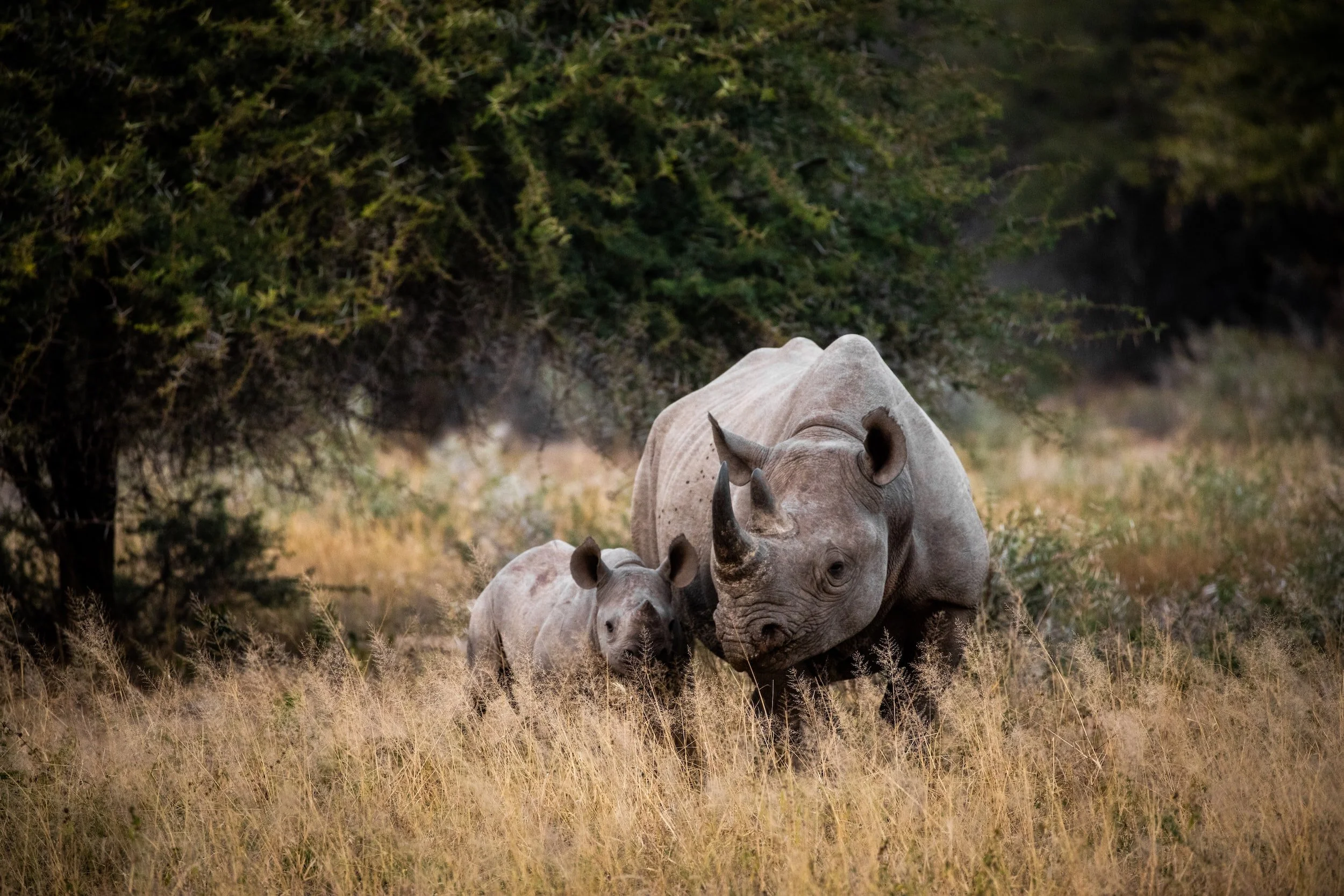The Big Five– What are Those?
Did you know? Initially, the term “The Big Five” referred to the five most difficult animals to hunt: lion, leopard, rhinoceros, elephant, and African buffalo. In the past days, these five animals were considered to be dangerous, and hunters used their carcasses as a trophy. Nowadays, the term “The Big Five” is mostly used by safari-goers from around the world, referring to five of the biggest mammals you can observe in the wild (while only taking shots with a camera).
Fact#1: You can predict a male lion’s age by taking a look at its mane; the darker the mane, the older the lion
1. AFRICAN LION:
“The king of the jungle,” the African lion is the biggest, baddest apex predator of them all. The most feared predator now, in the past 20 years, their population has shrunk to only 50 percent. The IUCN red list status for African lions is vulnerable, and the current population is decreasing. There are about 20,000 lions left in Tanzania - the highest density in all of Africa. A fun fact about lions is that they are the only cats living in a group known as a “pride.” A pride can consist of two or more lions (oftentimes more than 15 lions) with a small number of male lions and a big number of lionesses and cubs.
The lioness is usually the one who goes hunting and feeds the cubs. Lionesses hunt in a team to have the upper hand during the hunt, since their prey, such as zebra, wildebeest and antelope, are faster than the lioness. Only 20% of attempted hunts are successful. Male lions are guardians of pride. They mark the pride’s territory with their urine and prevent intruders from attacking the pride.
WHERE CAN YOU FIND THEM IN TANZANIA?
In Tanzania safari, you can find African lions in:
Serengeti National Park,
Ngorongoro Conservation Area,
Lake Manyara National Park,
Ruaha National Park
Nyerere National Park
2. LEOPARD:
The leopard is the most elusive of all the big cats and is known for its amazing climbing skills. Their strong shoulder bone supporting their muscles helps them climb a tree more easily than their cat relatives. They use this advantage when hunting. They stalk their prey from the top of the tree, and when the timing is right, it pounces and attacks (usually at night time). Sometimes, lions and hyenas “participate” in the hunt, complicating leopard hunting. Because of this reason, they tend to take their hunted prey to the top of the tree where other predators don’t reach them.
Did you know? There are nine leopard subspecies, and each of them is subtly different. You can identify the differences by looking at the pattern in their skin. On the IUCN scale, leopards are classified as vulnerable.
They are solitary animals, and you can spot them prowling at night if you go on a night safari. During the day, you usually find them up in the trees. You are lucky if you see this stealthy “shadow hunter” on the safari.
WHERE CAN YOU FIND THEM IN TANZANIA?
The probability of sighting an African leopard is high when you visit the following place on your safari tour:
Serengeti National Park,
Ruaha National Park
Ngorongoro Conservation Area,
3. AFRICAN ELEPHANT:
This gigantic mammal is a sight to behold. They are more enormous than their Asian counterparts, whose ears are also a lot smaller. Unlike the lion and leopard, elephants are herbivores, and you can easily spot them in the plains of Tanzania.
WHERE CAN YOU FIND THEM IN TANZANIA?
The best places to see an African elephant in Tanzania are
Tarangire National Park
Serengeti National Park,
Ruaha National Park
Ngorongoro Conservation Area
4. AFRICAN RHINOCEROS:
Did you know that there are two types of rhinoceros in Africa - the white and black rhinoceros? The difference that sets these rhino apart is the structure of the lips and their horns. The black rhinoceros has a pointy upper lip, while white rhinos have square lips. The horns of black rhinos are close in length to one another, while the front horn of a white rhino is much longer than the second. Rhinos are one the animals that are prone to extinction due to poaching. The IUCN rating for rhinos is ‘extremely endangered. Like elephants, African rhinos are also herbivores and depend on healthy vegetation.
WHERE CAN YOU FIND THEM IN TANZANIA?
The following are the places where you can find the African rhinoceros in Tanzania.
Serengeti National Park,
Ngorongoro Conservation Area
Mkomazi National Park
5. AFRICAN BUFFALO:
Last but certainly not least, the African buffalo is unique compared to its counterparts in the Big Five group. They may seem docile, but they will show their true face when you irritate them or pose a threat to them. It is considered to be the most difficult animal to hunt. Their arch-enemy is the lion, and their fight is fascinating to watch. Lions employ tactics to bring down the buffalo, always trying to stay clear of their iron-hard horns. African buffalo are herbivores and eat a big part of their body weight each day to maintain their muscle mass.
WHERE CAN YOU FIND THEM IN TANZANIA?
African buffaloes can be seen in the following places in Tanzania:
Serengeti National Park,
Ngorongoro Conservation Area,
FAQs
What is the best place to see the Big Five in Tanzania?
In Tanzania, the best places to see the big five are:
Serengeti National Park
Ngorongoro Conservation Area
Ruaha National Park
Tarangire National Park
What month is best to see the big five in Tanzania?
The best time to visit to see the wildlife, including the big five in Tanzania, is either the start of the year (January to February) or July to October.
Can you see the Big Five in the Ngorongoro Conservation Area?
Yes, you have a good chance of encountering the Big Five in the Ngorongoro Conservation Area, specifically in the Ngorongoro Crater, since it is home to a healthy population of black rhinos.
Summing Up
Tanzania is truly a place that everyone should experience at least once in their life. Knowing where to find the Big Five in Tanzania will add to your experience. That is where we will help you. In our tailor-made Tanzania safaris, we cover all the places where the probability of seeing the Big Five is high. You can visit our website to get an overview of Tanzania's safari and visit our safari experience to know more about the different types of safaris and what you can expect from those safaris. This article hopes to provide information on the Big Five in Tanzania and where you can find them.






